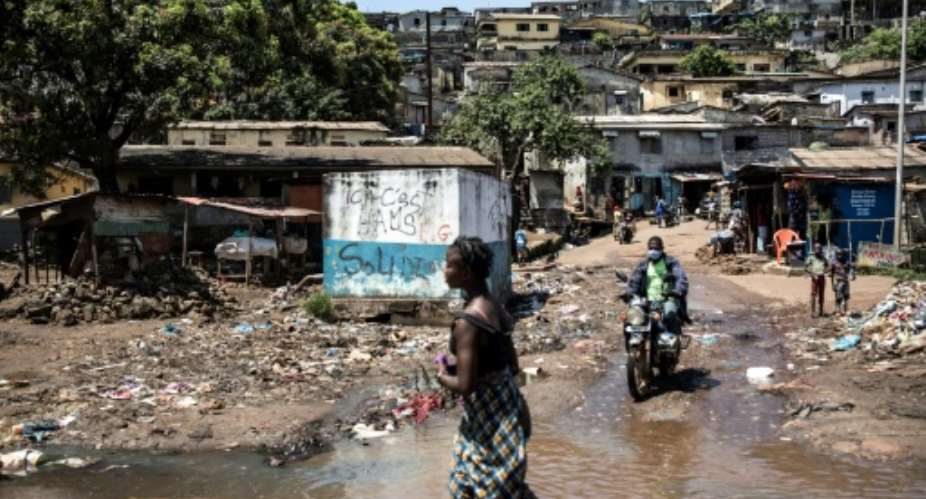Guinea is among the world's poorest countries, despite significant mineral resources, and has a turbulent political history.
Here is some background ahead of the presidential election on Sunday, in which President Alpha Conde is seeking a controversial third term.
Authoritarian regimes
Guinea won independence from France in 1958, becoming Africa's first Marxist state under President Ahmed Sekou Toure, who ruled for a quarter of a century.
Rights groups say his regime is responsible for the death or disappearance of 50,000 people, and the exile of hundreds of thousands of others.
Days after his death in 1984, Lansana Conte, a soldier, seized control and remained in charge until his own death 24 years later.
Multi-party rule was introduced in 1990 but elections were widely believed to be rigged.
After Conte died in 2008 after an illness, another military coup brought Captain Moussa Dadis Camara to power and plunged the country into chaos.
In 2009, security forces opened fire and mowed down demonstrators gathered at the capital's main stadium to protest against Camara's regime.
The United Nations said 157 people were killed and 109 women were raped in the deadly crackdown, while hundreds were wounded.
Camara survived a shot to the head a few months later and was removed from office, paving the way for a democratic transition.
First free election
Guinea held its first democratic elections in November 2010 and long-time political opponent Alpha Conde was voted president. He was voted in again in 2015, the constitution providing for two terms.
After periods of turbulence marked by violence at opposition demonstrations, protests broke out again in October 2019 against a Conde third term, leaving dozens of people dead in a security force crackdown.
Conde confirmed his plan to run for a third term in September.
He argues that the new constitution adopted in March resets the presidential term counter to zero, but the opposition has denounced a "constitutional coup".
Mineral wealth
More than 80 percent of the Muslim country is made up of ethnic groups, mainly the Fulani and Malinke.
The country is one of the world's biggest producers of bauxite, the ore used to produce aluminium. It is also rich in iron, gold, diamonds and oil.
Conde has enacted reforms to diversify the economy, including the mining sector which attracts foreign investment but is hobbled by poor infrastructure.
Agriculture remains the main source of jobs.
According to the African Development Bank (AfDB), gross domestic product grew by 6 percent in 2018 and 6.2 percent in 2019, thanks to increased foreign direct investment in the mining sector and some improvement in power generation.
But because of the coronavirus epidemic, the AfDB in April said it expected a slowdown in 2020 growth to 1.4 percent in the best-case scenario, and in the worst case, a contraction.
Guinea is also plagued by corruption, listed as 130th of 180 countries on Transparency International's rankings.
More than 55 percent of the population of some 13 million people live below the poverty line, and many have no access to electricity or running water, according to the World Bank.
Ebola
The deadliest epidemic of the tropical virus Ebola started in Guinea in December 2013, killing around 2,500 people there and affecting agriculture, mining, trade, transport and tourism.
The World Health Organization (WHO) declared the end of the epidemic in March 2016, after it had killed 11,300 people in the region.
Female genital mutilation is a widespread practice in Guinea, affecting 97 percent of women and girls in 2014, according to UNICEF.
Mandingo music
Along with Mali, Guinea is the cradle of Mandingo music, played with instruments such as the kora or the balafon.
Among its most famous celebrities is singer Mory Kante, best known for the 1997 dance song "Yeke Yeke," a huge hit in Africa and a No. 1 in several European countries. Kante died in May.





 "I can now see clearly with my two eyes, thanks to the generosity of Afenyo-Mark...
"I can now see clearly with my two eyes, thanks to the generosity of Afenyo-Mark...
 Election 2024: Power outages will affect NPP – Political scientist
Election 2024: Power outages will affect NPP – Political scientist
 NPP is 'a laughing stock' for luring 'poster-stickers', 'noisemaking babies' wit...
NPP is 'a laughing stock' for luring 'poster-stickers', 'noisemaking babies' wit...
 Dumsor: Matthew Opoku Prempeh must be removed over power crisis – IES
Dumsor: Matthew Opoku Prempeh must be removed over power crisis – IES
 PAC orders WA East DCE to process requests from their MP
PAC orders WA East DCE to process requests from their MP
 Defectors who ditched Alan’s Movement to rejoin NPP were financially induced – A...
Defectors who ditched Alan’s Movement to rejoin NPP were financially induced – A...
 Dumsor: Akufo-Addo has taken Ghanaians for granted, let’s organise a vigil – Yvo...
Dumsor: Akufo-Addo has taken Ghanaians for granted, let’s organise a vigil – Yvo...
 April 23: Cedi sells at GHS13.66 to $1, GHS13.07 on BoG interbank
April 23: Cedi sells at GHS13.66 to $1, GHS13.07 on BoG interbank
 GRA clarifies tax status of resident individuals earning income abroad
GRA clarifies tax status of resident individuals earning income abroad
 2024 elections: NDC to officially unveil Jane Opoku-Agyemang as running mate tom...
2024 elections: NDC to officially unveil Jane Opoku-Agyemang as running mate tom...
